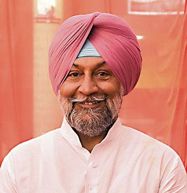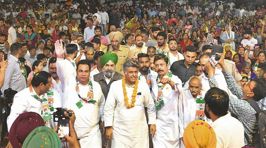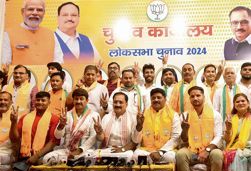The Union Budget for 2017-18 is in line with the BJP’s changed political stance of wooing the poor and shedding its “suit-boot-ki-sarkar” image. The Modi government has changed track and turned to the side where the numbers are — the poor, farmers and the middle class — which makes sense electorally. This is what every party tries to do — look credible on welfare and capture the constituency of the deprived. Congress and BJP budgets frequently look similar. How to deliver the dole is the real challenge and the switchover to a technology-based foolproof system is being unnecessarily delayed.
India’s economy moves mainly on four wheels-government spending, consumption, exports and private investment. This Budget focuses only on the first two. Exports have lost momentum due to a slowdown in Europe and the US. The situation can only worsen as Western leaders, including President Trump, increasingly turn protectionist. The windfall from oil has gone into refurbishing the government finances and good times may end if crude prices keep inching up. India’s companies, even the cash rich, are not investing — here or abroad. Bank credit offtake is at its lowest in decades. Jaitley has pumped more money into banks. He had no option other than stimulating demand with government expenditure.
Welfare carries its costs: more government, more taxes. Worse, the extended hand does not reach the needy. Since infrastructure is still not ready for direct cash transfers, the leaky system persists to the advantage of the vested interests. Poverty reduction efforts have drained the exchequer over the years. Competitive populism has led to cuts in funds for educational and health institutions which the poor access. It is not enough to say “farmers' income will be doubled in five years” without answering how and when. Incomes can rise if either farm inputs cost less or farm products fetch higher prices. The government is showing them the way to new markets. Job creation through MNREGA is welcome but Jaitley need not take much pride in making the “highest-ever” allocation for this UPA scheme. Instead the focus should be on plugging the leakages. MNREGA, say critics, is a needless burden on the taxpayer and a 2013 government audit found fault with its implementation.
Ideally, in keeping with economic reforms, the government should limit itself to taking care of essentials like education, health and infrastructure and make institutions deliver. Every rupee of the taxpayer’s money must be accounted for. Modi has abandoned his idea of a “minimum government”. A lean efficient government with vibrant institutions is possible but no party, it seems, needs it as there are activists to adjust and the downtrodden to look after. Why it should take this long to scrap the FIPB (Foreign Investment Promotion Board) is a mystery. States have many such white elephants that feed on limited resources.
Despite a questionable government approach the budget has a lot to commend itself. The budget’s rural, MSME, housing and infrastructure thrust would hopefully perk up consumption and employment generation. The grant of infrastructure status to affordable housing will help lower the costs for builders and attract buyers, while the steps to reduce the capital gains tax for property sellers may wake up the sleepy real estate sector. Individuals and MSMEs have been granted tax relief, possibly to compensate them for the pain of demonetisation, inflicted suddenly and thoughtlessly on an economy running smoothly. What is not broke need not be fixed.
Honest taxpayers and tax evaders should be treated differently. It is not enough to talk about a law to seize assets of economic offenders. Make it happen. Some states have already taken the lead. The drive against black money has kept a window open for political parties to let in nameless contributions. The 2,000 limit is open to as much misuse as the one for Rs 20,000. Jaitley has shied away from cleaning up an area notorious for peddling black money. There is a known route of laundering unaccounted cash through P-notes which remains unplugged.
Vote politics has weighed on priorities. Jailtey has not hurt any section but lost an opportunity for hard decisions. It is an incremental, more-of-the-same budget that does not inflict pain on anyone and is fiscally sound but falls below expectations of those looking for something transformative. Unexciting, Mr Jaitley.



























